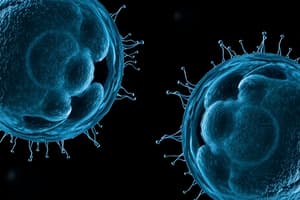Podcast
Questions and Answers
Which of the following describes the cell cycle?
Which of the following describes the cell cycle?
- The process of a cell dividing into two daughter cells
- The replication of DNA and organelles in a cell
- The partitioning of cytoplasm and components in a cell division
- All of the above (correct)
What are the two main stages of the cell cycle in eukaryotic cells?
What are the two main stages of the cell cycle in eukaryotic cells?
- Growth and accumulation of nutrients
- DNA replication and cell division
- Mitosis and cytokinesis
- Interphase and mitosis (correct)
What happens during interphase?
What happens during interphase?
- The cell replicates its DNA and organelles
- The cell undergoes cell division
- The replicated chromosomes separate into two new daughter cells
- The cell grows and accumulates nutrients (correct)
What are the control mechanisms that ensure proper replication and division of cellular components called?
What are the control mechanisms that ensure proper replication and division of cellular components called?
What is the process called when a cell divides into two daughter cells?
What is the process called when a cell divides into two daughter cells?
Flashcards are hidden until you start studying
Study Notes
Cell Cycle Overview
- The cell cycle is a series of events that lead to cell growth and division, essential for development and maintenance of all living organisms.
Main Stages of the Cell Cycle
- Eukaryotic cells undergo two primary stages:
- Interphase: the phase where the cell prepares for division.
- M Phase (Mitotic Phase): includes mitosis and cytokinesis, where actual cell division occurs.
Interphase Details
- Interphase consists of three sub-phases:
- G1 Phase (Gap 1): cell grows, synthesizes proteins, and produces organelles.
- S Phase (Synthesis): DNA replication occurs, resulting in two identical sets of chromosomes.
- G2 Phase (Gap 2): further growth and preparation for mitosis, ensuring all components are ready for division.
Control Mechanisms
- Checkpoints are control mechanisms that monitor and regulate the progression of the cell cycle, ensuring proper replication and division of cellular components.
- Key checkpoints occur at:
- G1 to S transition: checks for DNA damage and cell size.
- G2 to M transition: checks for DNA integrity and replication completeness.
- Metaphase stage during mitosis: ensures chromosomes are properly aligned before separation.
Cell Division Process
- Cell division is called cytokinesis when a parent cell divides into two daughter cells, marking the final stage of the cell cycle after mitosis.
- Mitosis consists of several phases: prophase, metaphase, anaphase, and telophase, ensuring equal distribution of chromosomes to the daughter cells.
Studying That Suits You
Use AI to generate personalized quizzes and flashcards to suit your learning preferences.




